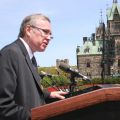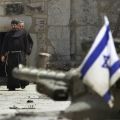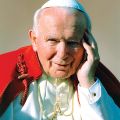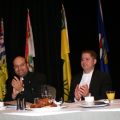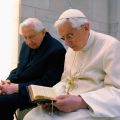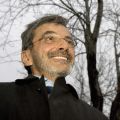ROME - Pentecost is a feast of unity, as the gift of the Holy Spirit makes possible the unity that the Lord Jesus desires for His Church. To preserve the unity of the Church is one of the first duties of the pastor. The flock is to be brought into the one sheepfold. Yet that remains a very difficult and delicate task. Two current examples, much discussed in Rome these days, point to different approaches.
Consider first the Anglicans. For the better part of 40 years there have been significant numbers of Anglicans looking Romeward, particularly after the unilateral decision in the Anglican Communion in the 1970s to ordain women, something never done by either the Catholic or Orthodox Churches. Many thought that such a unilateral rupture of common sacramental practice meant a definitive abandonment of the ecumenical path by the Anglican Communion, and therefore some measure should be adopted by Rome to make it easier for Anglicans to become Catholic while preserving something of their ecclesial communities and liturgical heritage. The Holy See took rather a different view. While provision was made for individual Anglican clergy, and individual Anglican lay people could always become Catholic in the normal fashion, there was no provision for groups to enter full communion together.
Making our way along the ‘progressive’ trail
By Peter StocklandTwo questions about political progressives have always stumped me: What do they think we are progressing toward, and how will they know when we get there?
Three months of student protests in the streets of Montreal fail to provide full answers, but they are prime evidence of an outcome. Nearly 50 years of progressive politics have produced a generation whose very vanity is a form of violence as bad as, perhaps worse than, smashed store windows, nightly street riots and quasi-terrorist attacks on the public transit system.
Ten years after the occupation of the Church of the Nativity
By Fr. Raymond J. de SouzaBETHLEHEM - Ten years ago, for 40 days in April and May 2002, the Church of the Nativity was occupied by armed gunmen. The Israeli Defense Forces (IDF) were outside, the Palestinian armed forces inside, and the Christian world fervently tried not to take offence.
It was a shameful episode, both in its substance and in the reaction to it, a sad signal at the beginning of this century that the persecution of Christians would proceed apace.
This golf lesson had nothing to do with my swing
By Robert BrehlThey say you can learn more about a person on the golf course than you can in a business meeting or a social setting. And I believe it.
Love it or hate it, golf has this magical quality of exposing fabrics of your personality very quickly to strangers. Sometimes these traits can be pleasant, or quirky, or annoying, or worse.
If you’re a golfer and have been paired with a stranger on the first tee, you know what I am talking about. From that first tee ball to the first green, before the first putt falls into the hole, often you can tell if it will be a long day or not. (Believe it or not, I have played golf with priests — an occupation not altogether unfamiliar with the game — who made for a long day and I knew it quickly! Most priests, however, are a delight to play with.)
New statutes for Caritas may have far-reaching consequences for new evangelization
By Fr. Raymond J. de SouzaROME - Much of the recent news from Rome deals with matters that, though important, will have minimal effect on the life of the Church as a whole. The negotiations with the Society of St. Pius X, the admission of former Anglicans to full communion, even the doctrinal assessment of one of the leadership associations of American women religious — all of these items are at the margins, rather than the centre, of the universal Church. The Society of St. Pius X has a significant presence in only a few countries, the former Anglicans in even fewer and the congregational leadership subject to doctrinal assessment represents an aging and rapidly diminishing component of American religious life.
Yet one recent piece of news is potentially of great significance for the daily life of the Church throughout the world. The Holy See announced last week reformed statutes for Caritas Internationalis, the global umbrella group of various Catholic development agencies.
Grievances hit a new low with complaint about Grace
By Joanne McGarryThe notice to file a human rights complaint over a Christian Grace being said at a City of Saskatoon volunteer dinner is the latest effort to remove even the briefest of faith references from public gatherings.
It would be easy to dismiss Ashu Solo as a crank, and a rather ill-mannered one, since he was among the invitees honoured at a city volunteer appreciation dinner where a blessing said by a city councillor did not meet with his approval. Mr. Solo was invited because of his work on Saskatoon’s cultural diversity and race relations committee. And anyone who thinks “cultural diversity” has something to do with respect for all religions and cultures hasn’t noticed how often the concept is used to remove Christian references from the public square.
A decided purpose will open up future choices
By Peter StocklandA young man I have known since cutting his umbilical cord 25 years ago will, if all stays on plan, be awarded a doctorate by an Ivy League university in about two years.
Along the way to his PhD, he earned a Master’s degree at Oxford after graduating from one of the Quebec universities whose students have been rioting in the streets since February.
Politics needs faith’s blessedness
By Fr. Raymond J. de SouzaOn May 1 in Ottawa I had the pleasure of delivering a speech to politicians and others at the annual National Prayer Breakfast. Below is an abridged version of that address.
My topic is “Faith in our Common Life: Why Politics Needs Religion.” But permit me to say a few words first about why politicians need religion.
Exactly one year ago, many of you were in the final moments of a federal election campaign. It was a Sunday and the people’s verdict was to be rendered the next day. On a typical Sunday morning I am found in my parish on Wolfe Island, in the St. Lawrence River across from Kingston, but a year ago I was in Rome awaiting the pronunciation of a rather different judgment. Pope John Paul II was declared blessed.
The healing power of forgiveness
By Robert BrehlThe other day, I finished a terrific page-turner and then picked up the newspaper to read about the latest attacks on the Christian faith, this time in Saskatchewan. They were two seemingly unrelated things that really got me thinking, searching deep down.
The book is best-seller Unbroken written by Laura Hillenbrand about a courageous American airman during the Second World War. If you’ve not read it, pick it up because it’s difficult to put down. But let’s talk about Saskatchewan first.
Pope’s early years marked by brotherly faith and love
By Fr. Raymond J. de SouzaROME - With the papal birthday and anniversary last week, attention in Rome was understandably focused on reviewing the seven-year pontificate of Benedict XVI. I had the unexpected pleasure though of reading about the other end of the Holy Father’s life — the early years of his Bavarian youth.
Last year an interview book was published by Msgr. Georg Ratzinger, the pope’s older brother. They were ordained priests together in 1951 and have enjoyed a close relationship through the years. After his election as Pope, the younger brother, Joseph, was not able to travel to Germany to spend time with Georg, so now the monsignor comes several times a year to Rome to spend time with his little brother, the Pope. They had originally planned to retire together to their home in Regensburg, but the events of April 19, 2005, permanently altered that plan.
Obvious to all but Fr. Gravel
By Peter StocklandQuebec’s euthanasia debate must be getting horribly confusing when even a Catholic priest doesn’t know the right answer to whether the practice should be legalized.
It must be doubly so when the priest is also a former MP who knows — or should know — that euthanasia can be made legal only by amending the federal Criminal Code.
Yet here was Fr. Raymond Gravel, the one-time Bloc Quebecois MP for a Montreal-area riding, musing about whether killing the elderly, the weak and the suffering might be just what the doctor ordered for Quebec’s health care system.



